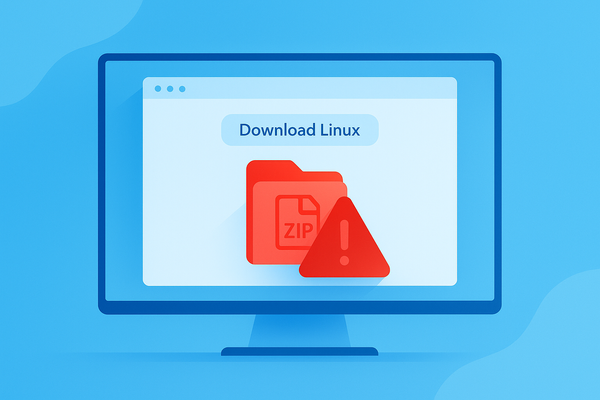Xubuntu Website Hacked to Spread Malware Via Downloads: What You Need to Know

The official Xubuntu website was compromised for a short time by unknown attackers who offered users a dangerous ZIP file disguised as an OS download. The file delivered Windows malware designed to steal cryptocurrency and modify clipboard data.
What exactly happened with the website
According to the community, Xubuntu.org visitors noticed that the regular .torrent file needed to download the Xubuntu Linux distro suddenly turned into a ZIP archive named xubuntu-safe-download.zip.
When the victim opened the archive, they found a Windows executable (TestCompany.SafeDownloader.exe) and another file labeled "Copyright (c) 2026 Xubuntu.org."
Users on Reddit's r/Xubuntu community were the first to raise the alarm
"The ZIP file includes an EXE that runs a fake downloader interface and drops a clipboard hijacker. Do NOT run it," one Reddit user noted.
The Xubuntu team confirmed that the site's downloads hosted the dangerous installer.
"We're beholden to our hosting environment for upgrades, and it looks like there was a bit of a slip-up here. It's being worked on, but for now, the Downloads page is disabled.
We're in the process of migrating to a static environment which should make things like this a thing of the past, but our team is quite small and busy."
Why this matters
Like any other project and open-source software, Xubuntu relies on web infrastructure that might not always be safe.
"We're beholden to our hosting provider and are still in triage mode," said a Xubuntu developer on Reddit, who confirmed that the problem originated from their hosting environment, not from Xubuntu's team. (Source: r/Xubuntu)
The attack underlines a few risks that might not be as evident.";
- Criminals will use brand names to target unsuspecting users.
- Fake installers can deliver Windows malware from legitimate-looking Linux websites.
- Checksum verification and digital signatures are critical for safe downloads, even if we don't often take them into consideration.
Similar Incidents
While this latest Xubuntu incident seems like a one of a kind, it's actually a way more common type of attack:
- Arch Linux AUR Trojan (July 2025): Attackers uploaded a malicious package to the Arch User Repository. The file contained a trojan that installed silently during package updates.
- Fedora DDoS and Mirror Breach (August 2025): Fedora's servers faced DDoS attack that was followed by attempts to inject modified ISO images through third-party mirrors.
- Red Hat GitLab Compromise (October 2025): Unauthorized access to Red Hat's GitLab instance allowed attackers to exfiltrate internal testing repositories.
- XZ Library: Seemingly unknown attackers have orchestrated a supply chain attack on a ubiquitous Linux library that would have given them backdoor access to most Linux systems worldwide, via the XZ library.
- Linux Mint ISO Tampering (2016): This is one of the earliest examples, in which attackers replaced official ISOs with a backdoored version that contained malware that connected to a remote server in Bulgaria.
How to Stay Safe
If you downloaded Xubuntu-hosted files:
- Avoid running any EXE or ZIP files downloaded from the website.
- Scan your system with Bitdefender Total Security to detect and remove the trojan.
- Reset crypto wallets and passwords if the file was executed on your Windows system.
- Use only official mirrors or the Ubuntu CD image server for future downloads.
- Verify SHA256 checksums before installing any ISO file.
The Xubuntu development team turned off the affected page and began a full rebuild.
"We've taken down the download page and will expedite the move to a static site to replace our aging WordPress instance," said a team member quoted by OMG! Ubuntu.,
Stay Protected with Bitdefender Total Security
Malware doesn't always hide in shady websites, and even trusted domains can turn into a source of malware. Bitdefender Total Security will protect you from these threats by using multilayered protection and real-time intelligence.
- Web Attack Prevention: Blocks access to hijacked or compromised websites.
- Advanced Threat Defense: Uses behavior-based detection to stop crypto stealers and zero-day exploits.
- Multi-layer Ransomware Protection: Guards personal files against encryption and tampering.
- Cross-platform protection: Secures Windows, macOS, Android, and iOS devices under a single plan.
Xubuntu FAQ
Is the Xubuntu ISO infected?
No. The Xubuntu team has confirmed that official ISO files and checksums remain clean. Only the ZIP archive from Xubuntu.org's torrent link contained malware.
Who's affected?
Windows users who downloaded Xubuntu from the official site during the affected period.
How can I tell if I'm infected?
If you run TestCompany.SafeDownloader.exe, check for clipboard manipulation, crypto loss, or strange background activity. Bitdefender Total Security identifies and removes the trojan automatically. If you already had the security solution installed, then the installation would have been stopped.
How long did the breach last?
It took roughly 48 hours for the Xubuntu team to remove the fake files and disable the page.
Can this happen again?
Yes. Even well-known platforms face risks. Regularly verify download checksums and rely on Bitdefender's web protection to block fake installers.
tags
Author
Silviu is a seasoned writer who followed the technology world for almost two decades, covering topics ranging from software to hardware and everything in between.
View all postsRight now Top posts
How Do You Manage Your Passwords? We Ask Netizens
December 18, 2025
Cybercriminals Use Fake Leonardo DiCaprio Film Torrent to Spread Agent Tesla Malware
December 11, 2025
FOLLOW US ON SOCIAL MEDIA
You might also like
Bookmarks








